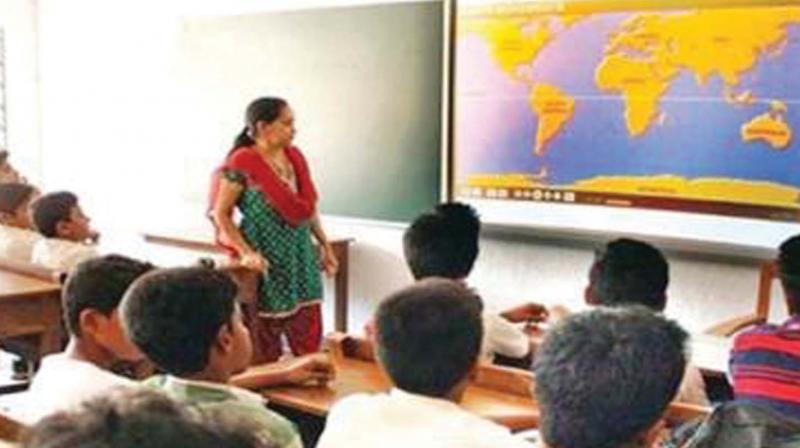Thiruvananthapuram: Teachers divided over education reforms
Classes 1 to plus-two to be made a single unit under newly created director of general education.

Thiruvananthapuram: Teachers’ organisations are divided along party lines over the General Education Department’s plan to bring lower primary, upper primary, high school and higher secondary education under one roof.
General Education Minister C. Raveendranath said that classes-1 to Plus- Two will be made a single unit under the Director of General Education. The newly- created post of DGE will integrate the Directorate of Public In-structions (DPI), Higher Secondary Directorate and Vocational Higher Secondary Directorate into a single entity.
The minister said that the government had no intention to fully implement the Khader committee report. Of the 14 major recommendations, only two aspects were approved by the government. This related to the improvement in academic quality and the administrative restructuring of the school system, Mr Raveendranath said.
Another major recommendation being implemented by the government is to merge vocational higher secondary with the higher secondary schools once the NSQF project is implemented fully. At present, 101 higher secondary schools have adopted NSQF.
The pro-UDF organisations which chalked out an agitation programme at a meeting held at Cantonment House, the official residence of Opposition Leader Ramesh Chennithala on Friday, decided to boycott the state and district-level ‘preveshanolsavam’ sche-duled for June 6. They will also boycott school-level higher secondary ‘preveshanolsavam’ sche-duled for the day. They plan to bring out booklets on the demerits of the report to back up their agitation.
On that day, they will organise an education protection meet at district centres. They have also decided to approach the High Court against the implementation of the report which they termed as incomplete. An Assembly march will be held on June 20 against the report.
Giving a political twist to the whole exercise, Opposition Leader Ramesh Chennithala told reporters after the meeting of teachers’ organisations owing allegiance to the UDF that the Opposi-tion would support the agitation. He also termed the report as a ‘Thuglak reform.’
KSU state president K.M. Abhijith has also made it clear that the students unions affiliated to the Opposition parties will support the strike.
Salient features of the Khader committee report
1. Classes 1 to 12 should be brought under a single directorate, the Directo-rate of General Educa-tion.
2. Examinations will be unified under a common examination commissioner, who will be the Dir-ector of General Educa-tion himself.
3. It advocates the transformation of the teachers as professionals to raise the standard of education.
4. All vocational higher secondary schools would be changed to secondary schools under the NSQF.
5. Lower primary, upper primary, higher secondary and vocational higher secondary wings in a school will come under a single principal.
6. Higher secondary principal, who is at present responsible for only higher secondary classes, will be the principal of all wings from lower primary classes to higher secondary.
7. The school headmaster will be the vice- principal of the whole school.
8. A common office will be opened for high school and higher secondary schools. At present, higher secondary section does not have an office.
Objections raised by opposition teachers’ unions
S. Manoj, general secretary of pro-Congress Aided Higher Secondary Teachers Association (AHSTA), told Deccan Chronicle that the decision to implement the Khader committee report was politically motivated. The members of the committee were not academics in the true sense, he said.
The recommendations were against the salient features of the Kothari commission report that suggested a 10+2+3 sche-me. The reason given by the commission for deli-nking pre-degree from college was that 40 percent of the energy for higher education was being spent for teaching in pre-degree courses. It was added to schools to ensure accessibility for education. Colleges did not have the same accessibility as that of schools. However, the qualification for Plus-Two teachers was fixed higher than that of other higher secondary teachers, Manoj said.
One reason pointed out for unification of higher secondary with high schools was to ensure efficiency in the announcement of results. The Plus-Two and Plus-One results could be announced in May itself. This pointed out that examination system is efficient now itself, Manoj said.
The Khader commission had made it clear that it was only the first part of the report that dealt with administrative aspect. The second part dealing with academic part has not come out yet. It was not correct to implement a partial report, said Manoj.
Plus points seen by pro-government teachers
N. Sreekumar, general secretary of the pro-CPI All-Kerala School Teachers Union (AKSTU), said that the decision to go for an agitation was politically motivated. The propaganda was that teachers in Plus-Two will have to teach in high schools and high school teachers will have to teach in higher secondary schools. This had created anxiety as the qualifications for higher secondary teachers were PG with BEd and SET. However, high school teachers needed only degree and BEd, said Sreekumar.
The minister in the meeting with teachers’ organisations said that primary school, high school and higher secondary will continue as separate units and that there was no question of higher secondary teachers having to teach high school classes, said Sreekumar.
There was a concern about the issues of teachers of vocational higher secondary after the change to the National Skill Quality Framework (NSQF).
Many vocational courses have not got approval under NSQF. The minister has agreed to call a separate meeting of vocational higher secondary teachers and look into it, he said.
Another propaganda was that the implementation of the report will result in loss of promotions. Promotions of teachers would not be affected as the minister had promised that the posts of DDE, RDD, AD (VHSE), DEO, and AEO would continue to exist even after unification, Sreekumar said.

